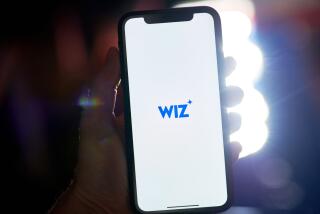MCI’s Joint Venture Passes Antitrust Test : Communications: Justice Dept. will allow British Telecom to purchase 20% of U.S. firm, paving the way for the two to launch new global service.
- Share via
WASHINGTON — In one of the first antitrust reviews of a major telecommunications deal, the Justice Department said Wednesday that it will allow British Telecommunications to go ahead with a modified plan to acquire 20% of MCI Communications Corp.
The alliance pairs Britain’s largest telecommunications company with the second-largest U.S. long-distance provider as they pursue the $10-billion market for international business customers.
The Justice Department proposed a consent decree that would allow British Telecom to purchase the $4.3-billion stake in MCI and permit the two companies to launch a joint venture, called Concert, to provide business customers with a single source for worldwide communications services.
The Federal Communications Commission is still completing a separate review to determine the extent and type of services Concert can offer. But the relief voiced Wednesday by jubilant company officials indicated they expect the FCC review to be a formality.
“This was a major hurdle for us, but as of today Concert is fully operational,” BT spokesman James Barron said.
“More than 50% of the world’s multinationals are headquartered in the United Kingdom or the United States, so this alliance starts with excellent market position,” said Gerald H. Taylor, president and chief operating officer of MCI Telecommunications Corp.
In exchange for Justice Department approval, the newly created Concert and MCI, which had 1993 revenue of $12 billion, agreed to disclose normally confidential information on the rates, terms and conditions under which they gain access to the British Telecom network. Those requirements are aimed at ensuring that U.S. telecommunications companies have the same access to markets in Britain that British businesses have here.
The consent decree, which needs court approval, followed a favorable department review of the merger of Paramount Communications Inc. with Viacom Inc. and is seen as further evidence that the Clinton Administration’s antitrust police may not be as hostile to big business as some had feared after President Clinton appointed plaintiffs’ lawyer Anne Bingaman as assistant attorney general for antitrust.
After months of watching deal making dry up in the telecommunications industry amid the uncertain regulatory environment, “people are now saying, ‘Thank goodness! A telecommunications deal that closed,’ ” said Blake Bath, an analyst at Sanford C. Bernstein in New York. “I think you are going to see this (trigger) a lot of other partnering” among long-distance carriers.
British Telecom had applied for antitrust approval more than a year ago. But the deal had languished at the Justice Department, which is still conducting reviews of AT&T;’s acquisition of McCaw Cellular Communications and Microsoft Corp.’s domination of the personal computer software market. It is also expected to look into a bid by the telephone monopolies of France and Germany to buy a 20% stake in Sprint Corp.
Although the other deals raise somewhat different antitrust concerns, the Justice Department’s decision to support the Baby Bells’ entry into the long-distance market--a federal judge has the final decision--were seen as an indication that the AT&T; and Sprint deals may also receive approval, experts said.
They may be playing catch-up, however. Some 21 companies, including First Data Corp. and Holiday Inn Worldwide, have already signed up for Concert, a $1-billion joint venture 75%-owned by British Telecom and 25% by MCI. British Telecom officials said that by next spring they expect the service will link 5,000 business customers in 55 countries.






